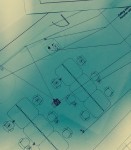What is DALI?
The Designing Active Learning Initiative (DALI) is a collaboration between City’s schools and professional services (Information Services, Learning enhancement and development and Property and Facilities) which began in January 2015. Funding has been secured to initiate the redesign and renewal of technology in City’s learning spaces.
In the summer of 2016 a selection of rooms in the Drysdale and Tait buildings will be redesigned. The selection of 15 centrally timetabled rooms covers a range of learning space types e.g. small, medium and large lecture rooms, small and medium lecture theatres and a PC lab. Although technology focussed, the redesign approach includes consideration of room layout, the amount of presentation space, including projection and whiteboard areas, and the improved capture of screen and voice across a designated teaching zone.
Why DALI?
City’s learning space technology (often referred to a PODs) has been in place for over 8 years and it has seen a number of updates and additions both minor and major. The DALI research identified that this ad hoc approach could not go on indefinitely. It was time to consider what a forward looking university requires.
The DALI aims reflect the different dimensions of the initiative.
- Optimise the University’s capacity to support flexible modes of education (i.e. interactive face to face, blended, distance) whilst enhancing existing practice.
- Enable active learning practices in City’s recently improved learning spaces e.g. diverse teaching styles, supporting small group work and encouraging creativity in pedagogic practice.
- Provide robust and reliable technologies for learning spaces, including a minimal core of technologies for all users as well as access to a wider range of emerging technologies.
- Provide an efficient management environment to deliver upgrades and maintenance of technologies in learning spaces, utilising technologies to monitor systems stability and to enable changes to be carried out efficiently, minimising loss of service.
How will school staff be involved?
In spring 2016 City’s Learning Spaces Group was invited along with other interested colleagues from the Learning Environment Committee to take part in a series of workshops that will keep pace with the stages of the DALI 2016 project. All schools responded to the call and each now has four or more representatives. LEaD are continuing to review membership in order to ensure a good cross section of disciplines are included as well as representatives from IS, learning success and PAF.
DALI LSG Workshop dates and draft programme
- 9th March 2016: DALI approach to redesigning a space
- 27th April 2016: Exhibition of the new Lecterns and space designs – Northampton Suite 11am – 3pm all City staff are welcome to drop in
- 1st June 2016: Teaching zone and technology design
- 20th July 2016: Staff induction and evaluation strategy
Once the timetable for September 2016 takes shape, staff teaching in the 15 rooms will be contacted and an induction programme will be devised to suit their needs. LEaD will also be inviting staff take part in an evaluation of the design and the technology over the year.

My DALI: Sandra Partington, Senior Educational Technologist LEaD
I have been involved in the DALI since January 2015, taking part in the initial requirements gathering workshops and developing the business case and presenting it to different committees and forums as part of the DALI core team over the last 6 months. I will be working with LEaD colleagues to ensure there are a range of opportunities for the academic community to contribute their experience and knowledge to the project, plus designing the induction and evaluation activities for the autumn term.


Leave a Reply